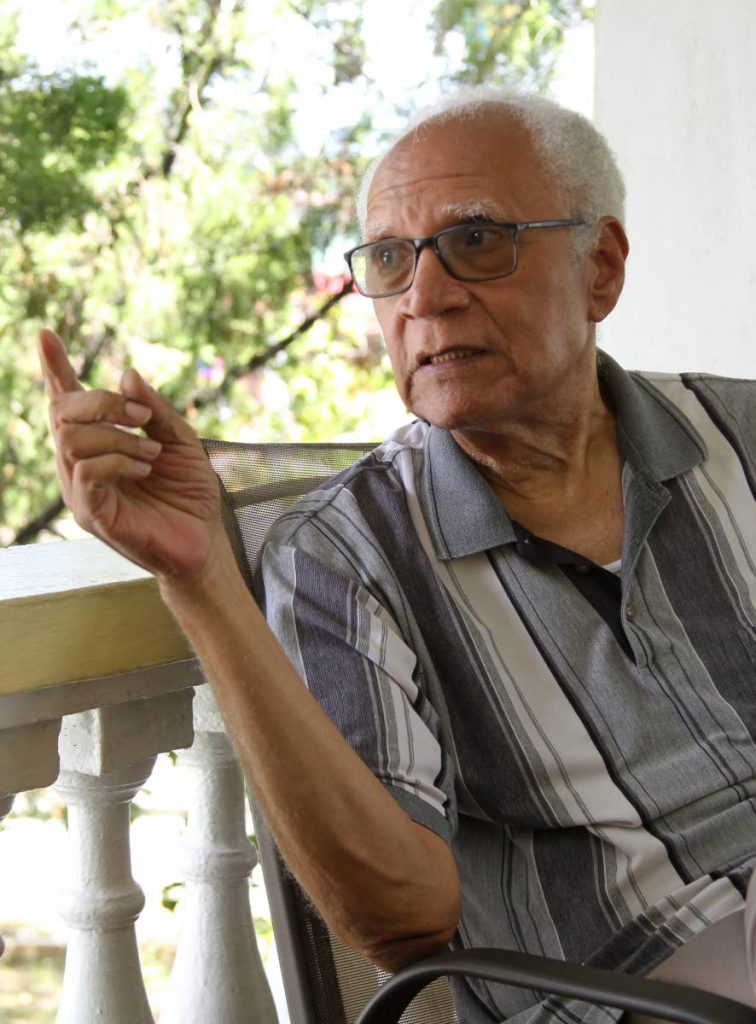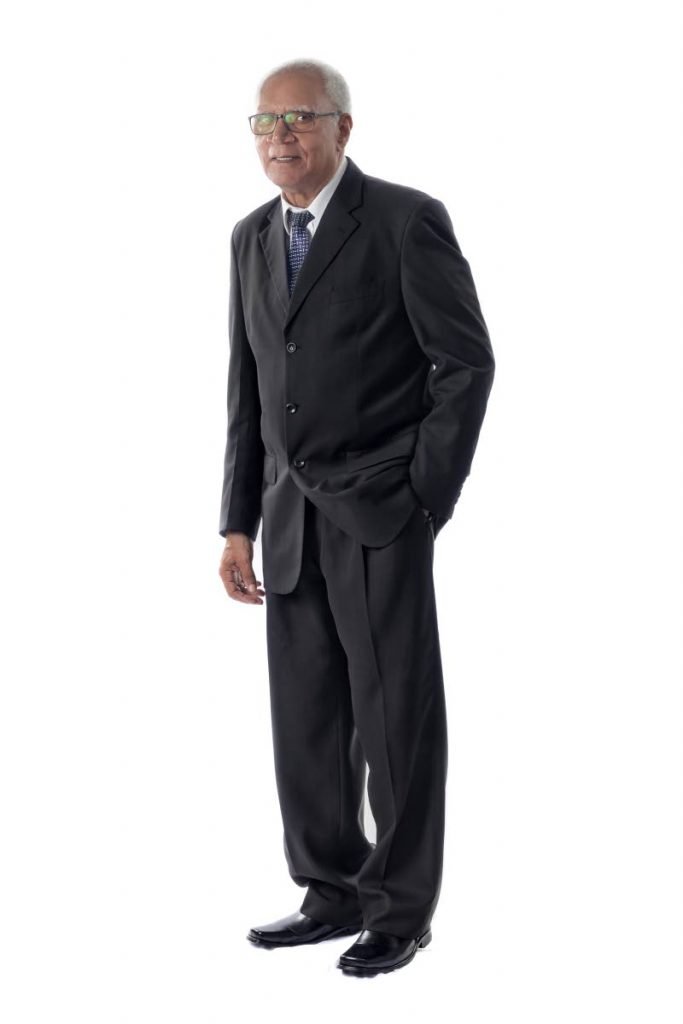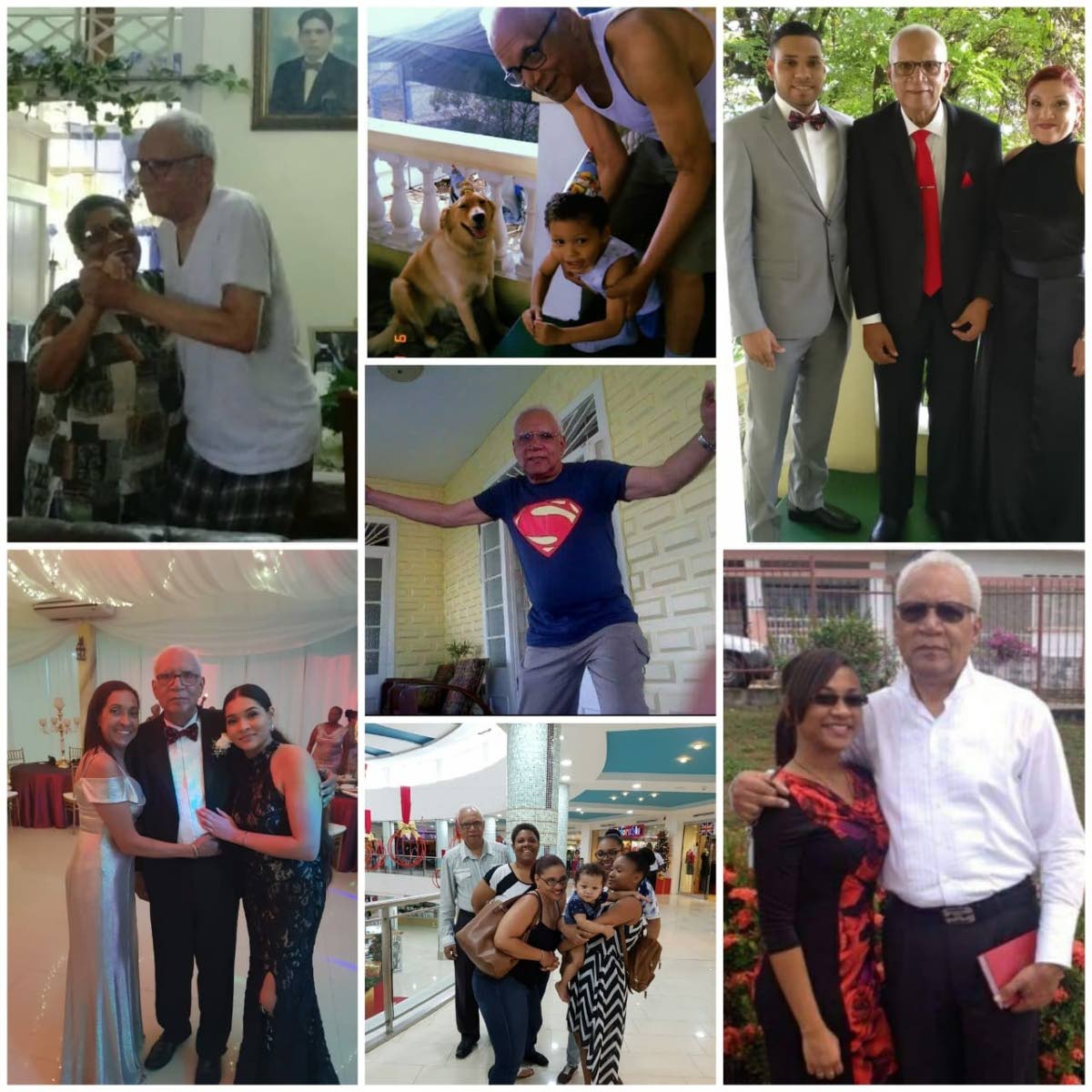Life with 'Uncle Jonesy': Family, friends share insight on Jones P Madeira

Sunday Newsday reflects on the life of Jones P Madeira, who, last month, retired after six years as the Newsday's editor in chief and then executive editorial consultant. His story could fill many books, as he is revered not only as a media veteran – in print and broadcast – and communications specialist but as a calming presence on television for a population witnessing live an attempt to overthrow the government by insurgents in July 1990.
Conversations with his family, former colleagues, and Madeira himself reveal the extent to which he has touched the lives of many – even some who never met him.
Although Jones P Madeira is known for his competence in various forms of media and communications, one of his most outstanding qualities is his kind-heartedness.
This was the consensus of people from various organisations as they spoke to Sunday Newsday about the man who was described as a hero when the staff of the TTT television station was taken hostage in the 1990 attempted coup by the Jamaat al Muslimeen.
The second of his three children, Lorilee Madeira-Williams, said when people visit the family home in Arima, they generally do not want to leave, and at some point end up calling Madeira "Uncle Jonesy."
“The Madeira household, we call it the 'house of plenty,' because Mom (Melba) and Dad treat all of our friends as if they were their children. Everybody who comes to our home is always made to feel welcome. I have friends who I went to school with who literally grew up in my home and they still come to visit.”
She described her father as a giving and forgiving person – which, unfortunately, led to some people taking advantage of his kindness. She also said he rarely raised his voice and is “too soft” with people in his professional life. as he often gives them second or third chances.
Yet she said her father was an inspiration, as he came from a very humble background: he literally went to school barefoot and worked hard to make a comfortable life and name for himself.
She said she recognised she and her siblings, Melanie and Justin, were privileged and never had to go without life’s necessities. Further, because he travelled a lot, he brought them things that many people in Trinidad would not have had at the time. For example, she said he once brought his daughters skateboards when he returned from Australia, and they were a novelty because no one else had them.
“While we did not know what it was to do without, because we had the best of everything, he ensured that we appreciated what we had and from early on we learned to share. We learned that we had to earn our keep, that we needed to work for what we wanted, and that there were consequences to all our actions. That resonated with me.”

However, life has not been all fun and games. Lorilee said she was harassed and teased in primary school as other children possibly believed she felt she was “special” because people knew her father.
Then, when she was older, she felt as if she lived under a microscope and so always had to walk the “straight and narrow” path because whatever she did would reflect on him. Even so, she said she was the most rebellious and gave the most trouble, but her father always supported her.
She told Sunday Newsday she became pregnant when she was 18 and while he was not upset with her, he was a bit disappointed. She recalled attending an event with her father and a week later there was an article in a weekly newspaper insinuating that Madeira was the father of the child.
“I guess that was the price of 'celebrity.' When I was a teenager I couldn’t wait to get married so I could change my name because everyone knows who you are.”
She recalled that he was always busy but he made time for his children. She said as a teenager, when she, and later Justin, went to parties with friends, Madeira would drop her and her friends and pick them up at a prearranged time, usually between 3 and 6 am, and drop everyone home.
She also clearly remembered July 27, 1990. She said she and Melanie had gone shopping in Port of Spain with their father that afternoon, as they were planning to take a family vacation soon. They took a maxi to go home while he returned to work at TTT.
They arrived to learn that the Jamaat al Muslimeen had taken their father hostage, along with his co-workers at TTT, as well as numerous government members at the Red House.
“When we got home Mummy was sweating bullets because this bacchanal was happening in Port of Spain and she couldn’t get on to Dad, and we didn’t have cell phones in those days, so she didn’t know where her children were. We walked through the door and saw what was happening on TV.
"Those six days I would not wish on my worst enemy.”
Justin said he is very proud of all his father has achieved. He said Madeira did not grow up privileged and Madeira’s father was not “very present” in his life, but he did his best. All the same, he said his father is an exemplary man, which shows in the way many people who know him love and respect him – especially Justin’s four-year-old son, Jacob.

“It’s wonderful, him being my dad. I had the perfect example of a father to be a father to my son. I don’t think I could ever live up to what my father has done, but if I am but a portion of what he has done for me throughout life, I would have been successful.”
That success, Justin said, was not dictated by his father, who never had any expectations of him following in his footsteps, nor was he pressured to live up to the Madeira name.
“He always said his name should not carry anything but the merit of his hard work. The only thing you were taught was to be a good person, treat everyone how you would want to be treated and to represent your family in a positive way.
“And those values remain. We were always taught not to look down on people in any way, and everyone has the utmost respect for him and for everyone in our household.”
Justin said he never really paid attention to his father’s “fame” because to him, his siblings and to others his parents had unofficially adopted, he was just “Dad.”
“We don’t see him as famous. He’s the same old clown, always joking, the epitome of calm but who knows when to be serious.”
He said his older sisters “bore the brunt” of that fame while he only felt “the edge,” but when he was younger, some people who knew about his father believed he felt he was privileged or special.
But Justin did not think his name either hampered or enhanced his life, as he never used his father’s name to get favours or special treatment. Even so, he said even at work he did not use his last name when introducing himself because some people would think he was “throwing around” the Madeira name.
A journalist in the Judiciary
One of the places the Madeira name can be thrown around is at the Judiciary, where he headed the Court Protocol and Information Unit.
Chief Justice Ivor Archie said shortly after assuming office, he realised the Judiciary needed a respected professional to handle the messaging and image of the organisation. He had heard of Madeira and of his reputation as a “fair-minded, thorough and professional journalist” and so was “thrilled” when Madeira agreed to take the position. He got to know Madeira personally and Madeira soon became more than an employee and valued member of the senior management team.
“Words like 'big brother,' 'confidant,' 'sounding board' all come to mind, but are inadequate to capture the breadth of his influence on those of us who were fortunate to be his colleagues.
“I was blown away by his insight, wealth of experience and knowledge. Yet he was always respectful, tactful and exuded a grace, humility and dignity that could not be faked.”
He said Madeira quietly carried out acts of charity and compassion because he felt it was the right thing to do.
“I have never seen him rattled, even when he had more than enough reason to be angry or agitated.
"Many will remember him as a voice of calm and a beacon of hope during the 1990 coup attempt. I hope that book will be written!”
Archie added that Madeira is deeply committed to his family and those in the Judiciary are a part of his extended family.
"It is my understanding that he is due to retire shortly, having mentored two generations of journalists. The profession will be left much poorer by his absence at a time when standards have continued to decline.
"But he has earned his rest and the company of his grandchildren, who he adores.
"On behalf of myself, my immediate family and team judiciary, I offer prayers and best wishes for a long and happy retirement."
Former senior court communications officer Cassie Ann James agreed with Archie’s assessment. She said her three years working with Madeira were enriching and she was able to learn and grow personally, professionally and spiritually. To her, Madeira was a father figure and that feeling was enhanced when he integrated the unit into his family.
She said as the head of the Court Protocol and Information Unit, Madeira took a keen interest in the development of his staff, colleagues and his organisation, but especially the young people.
“When he identified talent, he would try his best to support it, hone it, and give you an opportunity to shine and grow. So as a mentor, he did wonderful work in harnessing the skills of what was a very young unit.”
She said he also took an interest in their personal and spiritual development, so that his office sometimes felt like a counselling centre. She said he was the “old wise man” who supported anyone who wanted to tap into his rich resource of professional and personal information.
“Mr Madeira is a dying breed. You don’t really meet people with that level of kindness nowadays.”
James added that he was very diplomatic and balanced the different aspects of his job well.
“Mr Madeira quelled a lot of fires with such quiet poise that you would be surprised to know that anything actually happened. Through his intervention, support and advice he saved the organisation from a lot of backlash and bad press.”
A friend and hero
Veteran broadcaster and boyhood friend Neil Giuseppi said over the years Madeira developed a wealth of knowledge, was committed to any organisation he worked with, and he was honoured to call Madeira his friend.
“He is one of the most honest and hardworking people I have ever known. He is very straightforward and has always been determined to better himself and TT.
“I was very proud when he received the Chaconia Medal (Gold) in 2018. I cannot think of a more deserving recipient.
"But if Jones has one major fault it’s that he can’t say no to anybody, and people take advantage of that. I have been telling Jones for years that he needs to slow down, but he doesn’t listen. I think he’s so committed to the people of TT as a whole that he just doesn’t listen. And he asks for nothing in return.”
Giuseppi said Madeira joined 610 Radio in the early 1960s and was part of a great news team that revolutionised the news business. So, in November 1990, when Giuseppi became managing director of Trinidad Broadcasting Network, Madeira was the first person he hired, as head of news. They then went on to build “the most powerful news team in the country.”
He said Madeira was his second in command and adviser, and they would talk for hours about strategies to provide a better quality of programming, especially since the government had recently deregulated the broadcast industry and new radio stations were being created.
Later, Giuseppi launched Radio Tempo 105FM, the first all-local music radio. He said Madeira took a personal interest in it and they came up with several shows and programmes which proved very successful.
One of Madeira's ideas was to take the station on the road. They would broadcast from different places throughout the country and, without being invited, artists would turn up to perform free of charge and people would flock to the location.
All this, Giuseppi noted, was– just three months after the attempted coup.
“Jones was the undoubted hero of that hostage crisis. All the fellas who were hostages, to a man, said it was Jones’ management of the situation that possibly saved all their lives. They said he was the strength of the group, he gave them hope to carry on, not to give up, he was always there.”
He said he did not think Madeira was negatively affected by being a hostage. He believed being an active participant by caring for others, negotiating, and other activities, helped him accept the events of those six days.
One of the people who consider Madeira a hero is veteran journalist Dominic Kalipersad.
“I have to thank Jones P for my life. He literally helped save the lives of all the hostages held at TTT during the attempt at a coup d’etat by the Jamaat al Muslimeen in July 1990.”
Looking back on those events, he remembers seeing the concern in Madeira’s eyes when he told Kalipersad he could be set free in exchange for food. He also remembers the "intensity of Madeira’s countenance" when Kalipersad declined unless everyone could also leave, because, he said, they both know Kalipersad would have been killed if he had agreed.
“It was a kind of paternal concern that Jones P had for his staff in whatever newsroom he led. He was intimately aware of his staff needs; after all, he rose through the ranks from a reporter at Piarco.”
In addition, he said Madeira was able to step seamlessly in and out of formal journalism without tarnishing his credibility or respectability. His national award was “shamefully late” but well deserved.
“His departure from media would be a great loss to the industry and, more especially, to the young journalists of today, as I can think of no existing editor who can parallel his knowledge and experience. Hopefully, health permitting, he would be given the opportunity to mentor those who wish to benefit from his genius.”




Comments
"Life with ‘Uncle Jonesy’: Family, friends share insight on Jones P Madeira"